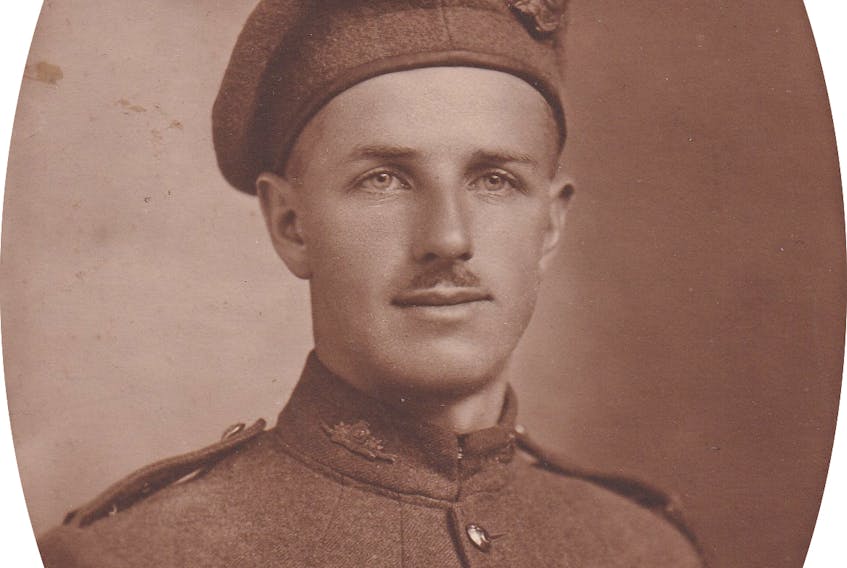One hundred years ago, Sergeant Alexander Daniel MacDonald, Thorburn, Pictou County, distinguished himself on the Passchendaele battlefield while serving with the 85th Battalion (Nova Scotia Highlanders).
Born on October 10, 1894, he was the eldest son of Duncan C. and Lexina "Lexie" (McLaren) MacDonald. Alex, as he was known to family, enlisted with the 85th Battalion at Halifax on November 3, 1915. The following spring, his younger brother—Duncan’s second son, John Archibald “Jack”—joined him in uniform. The brothers accompanied the 85th to England in October 1916 and crossed the English Channel to France in early February 1917.
On April 9, 1917, Alex and Jack were in the support trenches, awaiting orders to commence the 85th’s non-combat assignments while the Canadian Corps launched its historic attack on Vimy Ridge. In late afternoon, military commanders ordered two of the 85th’s Companies into the line. During the early evening, the inexperienced soldiers secured possession of Hill 145, the ridge’s highest elevation, at a crucial point in the day’s fighting.
Following its Vimy debut, the 85th commenced regular tours in the forward area with the 4th Canadian Division’s 12th Brigade. Alex and Jack served with the unit throughout the spring and summer of 1917, each receiving promotions to the rank of Corporal. Alex rose steadily through the “non-commissioned” ranks and was promoted to the rank of Sergeant on October 1, 1917.
Two weeks previously, while on duty in the Avion Sector, near Lens, France, Jack was struck in the left ear by a piece of artillery shrapnel and suffered a fractured ear drum. He was evacuated to hospital at Étaples, where he remained for five months.
Meanwhile, Sgt. Alex MacDonald accompanied the 85th northward to Ypres, Belgium, and entered the front trenches on the night of October 28, 1917. Two days later, the unit participated in the second stage of the Canadian Corps’ attack on Passchendaele Ridge.
At 5:50 a.m. October 30, Alex waited in reserve with his Company, while the battalion’s remaining three Companies advanced toward the day’s objective. Within minutes, a fierce firefight erupted in No Man’s Land, so intense that “anyone who attempted to walk upright instantly became a casualty.”
During the opening exchanges of artillery fire, Alex was struck by a piece of shrapnel but remained at duty. He was wounded a second time when his Company Commander ordered Alex’s platoon “over the top” in support of their comrades, but continued onward toward the raging battle. When his Platoon Commander was wounded during the advance, Alex assumed command and directed his men forward.
German resistance broke as the reserve soldiers reached their comrades in No Man’s Land and the 85th pushed onward to its final objective. While supervising the establishment of a new defensive line, Alex was wounded for a third time and finally evacuated by stretcher for treatment.
His superiors later commended Alex’s efforts: “Throughout the whole attack, he showed the greatest resourcefulness, cheering his men and, although wounded twice, would not give up.” Alex received the Distinguished Conduct Medal, in recognition of his bravery and determination on the Passchendaele battlefield.
On October 31, Alex was admitted to a nearby Casualty Clearing Station for treatment for wounds to his face, arms and left side. He remained there in serious condition for almost three months. Finally, on December 27, medical personnel managed to evacuate him by ambulance train to No. 2 Australian General Hospital, approximately 40 kilometres north of Étaples, where Jack was convalescing.
Within days of Alex’s arrival at Wimereux, Jack was at his side. In a later letter to his parents, Jack stated: “I sat by his bed and he talked quite a lot. He did not lose his memory and he was quite all right intellectually.”
Jack spoke to Alex’s doctor, who “still had great hopes for him.” On the afternoon of January 4, 1918, Jack sat beside his bed for several hours, describing Alex’s condition as “quite bright but not as good as the day before.” At 4:30 p.m., Jack “went out for tea,” promising to return “at half past six as usual.”
Shortly after his departure, Alex “took a very bad turn” and medical personnel summoned Jack to his side. He later described the evening’s events to his parents: “I got there about five minutes to six and when I went in, I stood by his bed, he looked up, and told me to get a chair. That was the last he said before he passed away [at 6:30 p.m.].”
During the afternoon of January 5, 1918, Sgt. Alex MacDonald was laid to rest in Wimereux Communal Cemetery, “ a nice, quiet place on the side of a hill.” Jack described his feelings as his older brother was laid to rest: “You can’t imagine how sad and lonesome I felt when the bugler blew the last post over the grave.”
In late February 1918, Jack rejoined the 85th in the field. For the remainder of the war, he served at the front with the battalion, receiving a promotion to Quartermaster Sergeant on September 3, 1918.
Jack was formally discharged from military service on June 15, 1919 and returned to Pictou County and then went to work in Vancouver for a time. On June 27, 1923, Jack married Barbara Beaton. The couple later relocated to Moncton, N.B., raising a family of two sons while Jack worked as a payroll accountant for Canadian National Railway. Jack MacDonald passed away on April 16, 1974 and was laid to rest in Moncton, N.B.









